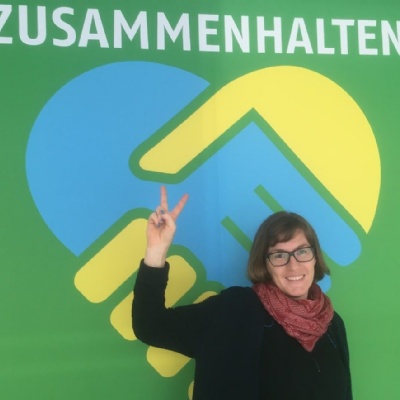Green Party Advisor on her UWC Experience

When Kathrin Blaufuss (UWC Adriatic, 1994-1996) applied for a UWC scholarship part of the selection process involved applicants giving a short presentation to their peers. “I remember I spoke about the importance of protecting rainforests – an issue I still work on today.”
Indeed, today Kathrin advises The Green Party in the German parliament on biodiversity, forests and hunting. “The UWC experience is no doubt one reason why I always look at the global dimension of any problem” Kathrin says. “My party is currently in opposition, so I cannot create laws. But I love the democratic process – partly, I think, because I loved the challenging and frank debates we had at UWC.”
After UWC, Kathrin lived in the UK, Ghana and Cuba before returning home to Germany. In Ghana she worked on rural livelihood and mobility issues in a project funded by the UK’s Department for International Development. She gained a PhD in Geography and Anthropology at Durham University in the UK; her PhD analyses the politics of organic agriculture on Cuba.
“The 2 years at UWC had the biggest impact on my life in all aspects, personally as well as professionally. For a start, the teachers in Duino taught us to think, reflect, argue and question what we learn. There was less of the top-down regurgitation of mere textbook knowledge that I was used to from school at home. Instead, we were taught to put things in context as well as to question and reflect. There is so much subjectivity to what constitutes knowledge and Duino gave ample room and space for this.
And the UWC school experience goes far beyond mere academic learning. I had never imagined that an institution would put so much trust in us as young adults (adolescents even). They trusted us to be able to judge and to take on huge responsibilities for us and fellow students at such a young age. I was given the feeling that I counted; that my views and abilities were taken seriously and trusted. For example, as second year students, we checked that first years were properly secured while climbing; it was expected of us to live up to this responsibility as mistakes could have been dangerous.
Though I first studied Environmental Science, it was the UWC experience that made me not only interested in how other societies and cultures functioned but also able to constructively engage with what in the first moment may appear as strange or even irritating. At UWC I learned that the world does not fit into neat boxes – it is not as simple as the dichotomies of developed/underdeveloped, rich North/poor South etc. suggest. Without UWC, I would certainly never have gone on to study International Development at Sussex University nor had the courage to head to Cuba and untangle the multiple views and agendas that are shaping Cuba’s agricultural development today.
In my work in parliament, I especially enjoy working with great people on issues I care about. I feel strongly about wanting to make an impact and where better could I do this than in the political realm looking out for a sustainable future for the next generations.
UWC is also about giving back, as it was a real privilege to attend. I serve on the German National Committee´s Board, worked on the team that made the UWC Robert Bosch College possible, organized and led a UWC Short Course in 2012 and last year combined my 20 year reunion with a volunteering week at a Red Cross refugee camp in Udine. Current UWC students now continue this work, which is truly wonderful to see.
Finally, UWC is all about great friendships, which endure over many years and often over long distances. UWC is still part of my life every day through many of the people that I am closest to, including my husband who I met via the German UWC alumni network.”
